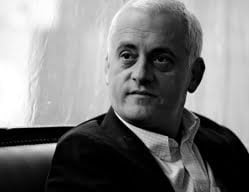
Beqë Cufaj
- Germany, Kosovo
- Zu Gast beim ilb: 2010, 2012
Beqë Cufaj was born and raised in the city of Deçan in western Kosovo in 1970. After passing his school leaving exams, he moved to Prishtina, where he studied Albanian Language and Literature. He graduated and went to Germany in 1995, where he settled outside of Stuttgart in a town named in Gerlingen.
His experiences are the subject matter of »205« (1996), a book in Albanian that combines poems and short prose. The title is taken from the room number Cufaj had in the social housing centre, where he used to live at the time. Selected poems were also published by the renowned literary magazine »Akzente«. Cufaj’s texts are characterized by a clear language and powerful images, and often deal with painful losses, death, a lost home and alienation. During the Kosovo war, the author published essays reflecting on what was happening in his country, which he tries to describe so that Western European readers can understand his perspective. His articles were printed by many European newspapers including »Frankfurter Allgemeine Zeitung«, »Neue Zürcher Zeitung« and the French weekly »Courrier International«. Cufaj is also a journalist and correspondent for the Kosovo-Albanian newspaper »Koha Ditore«. He was involved in the reconstruction of the influential daily after the end of the war. His book »Kosova – Rückkehr in ein verwüstetes Land« (2000; tr.: Kosova. Return to a devastated country) is an anthology of his writings, including very personal articles about his uncle, who was murdered, or excerpts from his diary, which appear as a lucid testimony of the time. The collection evokes a differentiated and true-to-life image of the destruction of his country, which, nevertheless, hopes for reconciliation. His debut novel was »Shkëlqimi i huaj« (2003; tr.: The glamour of foreign countries). This is a sensitively told and accurately observed story of two young Kosovo-Albanians, Arben und Ricky, again based on Cufaj’s own experiences, which, as we may assume, play a certain autobiographic role in the book. Childhood memories are of particular importance here. For example, when Arben speaks about the village where he was born at the beginning of the novel. From a child’s perspective, the perception of the events is even sharper, as in the following short passage, for example: »My father had told me, however, that the street, which was called Marshall Tito Street in our town, connected two big cities. The small town, where we lived, was, thus, only a stopover.« This is only one of many examples that reveal the stories that the two young men, who eventually meet in Germany, carry within them. Cufaj lives in Stuttgart and Prishtina.
© internationales literaturfestival berlin
205
Dukagjini
Peć, 1996
Kosova
Rückkehr in ein verwüstetes Land
Zsolnay
Wien, 2000
[Ü: Joachim Röhm]
Der Glanz der Fremde
Zsolnay
Wien, 2005
[Ü: Joachim Röhm]
projekt@party
Secession
Zürich, 2012
[Ü: Joachim Röhm]
